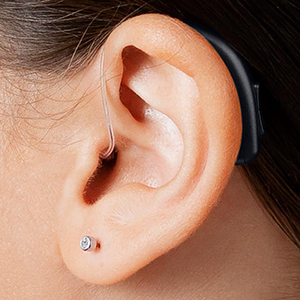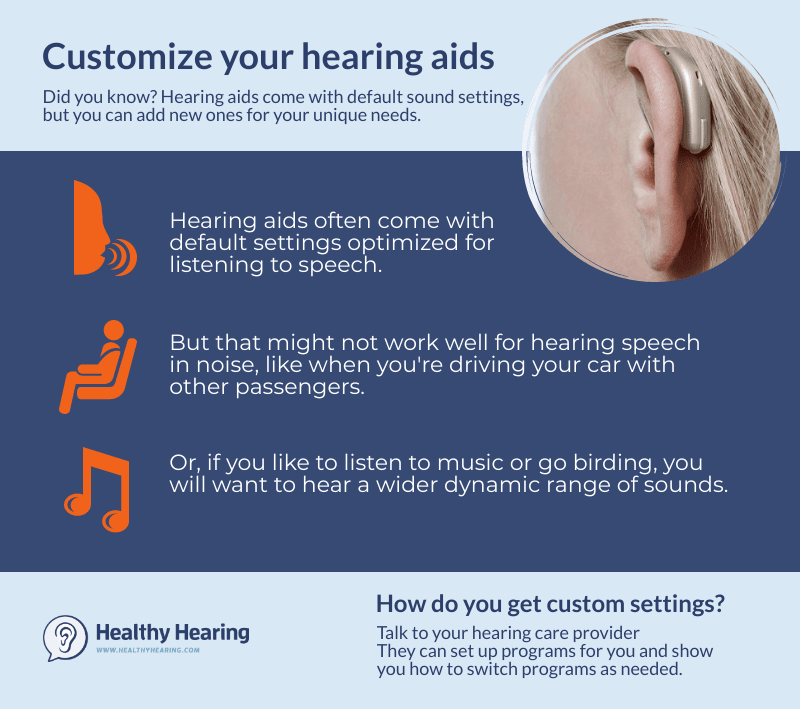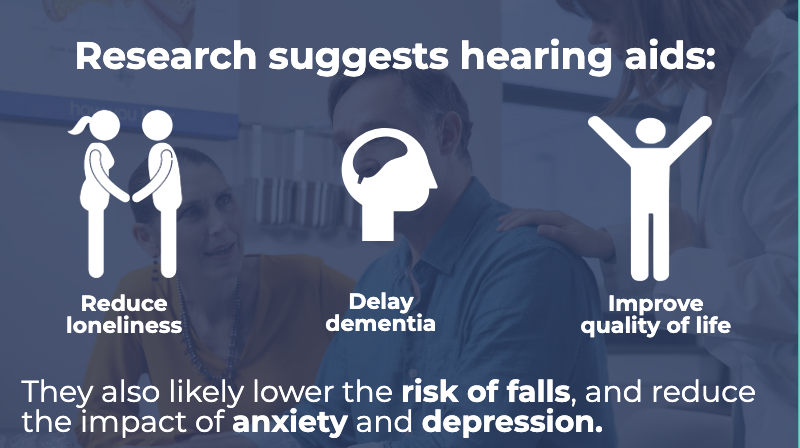For the millions of Americans who have hearing loss, hearing aids are usually the best option to help correct untreated hearing loss and resume a high quality of life. Many types and styles are available to suit every preference and lifestyle.
Table of Contents
What is a hearing aid?

model is the Oticon Opn.
Hearing aids are small electronic devices that can be highly customized to address different types of hearing loss. All digital hearing aids contain at least one microphone to pick up sound, a computer chip that amplifies and processes sound, a speaker that sends the signal to your ear and a battery for power. More sophisticated models provide additional features, such as direct connection to a smartphone or neural networks.
How do hearing aids help with hearing loss?
A hearing aid amplifies the sounds going into the ear. They are most often prescribed for people who have a type of hearing loss known as “sensorineural,” meaning that some of the tiny hair cells of the inner ear are damaged. The surviving healthy hair cells pick up the sound delivered by the hearing aid and send them as neural signals to the brain via the auditory nerve.
For people with mild-to-moderate hearing loss, standard hearing aids work best. “Power” models are often used for people who have severe-to-profound hearing loss as the batteries require more power.
How do I get hearing aids?
Hearing aids are typically recommended if your hearing test results show hearing loss on an audiogram. Hearing aids are sold at hearing and audiology clinics across the U.S., as well as online. Our extensive directory of consumer-reviewed hearing centers can help you find a local clinic.
What type of hearing aid is best for me?
_300x222.jpg)
aid that sits behind the ear.
Hearing aids can be classified into two main groups: in-the-ear (ITE) styles and behind-the-ear (BTE) styles.
Our guide to hearing aid types and styles discusses many options available to you. Sizes range from virtually invisible to filling the entire bowl of the ear. Your hearing care professional will be a vital asset in helping you pick the best style for you. You might also find it helpful to review the basic parts of a hearing aid.
Who makes hearing aids?
There are several hearing aid manufacturers that offer the latest hearing device technology. Hearing aid companies invest heavily in research and development to bring devices to market that address the diverse needs of people with hearing loss. They also strive to offer hearing aids that can accommodate all wearers’ budgets.
Most hearing care professionals are familiar with multiple manufacturers’ products and have the supplies and software they need to successfully fit their devices. When you visit a hearing care professional, you will discuss your hearing test results, lifestyle needs and budget. Your provider will help you select the most appropriate manufacturer and best product just for you.
Hearing aid technology
Many of the hearing aids produced today use telecoils and even advanced technology like artificial intelligence. Telecoils improve hearing in public settings, such as theaters and airports. Meanwhile, wireless technology allows two hearing aids (one on each ear) to communicate with each other and essentially operate together as one complete hearing system. It also means hearing aids can connect to external sources of sound that are transmitted wirelessly, such as via Bluetooth.
Even better? Many manufacturers now make accompanying hearing aid apps that give users added control over their devices.
Hearing aid fitting
Once a hearing healthcare professional recommends hearing aids for you, a number of factors will be considered when selecting and fitting a device. The best fit for you will depend not only on the severity and type of hearing loss you have but also your budget, cosmetic preferences, career demands and other concerns.
Because hearing aids are personalized, not every brand, style or technology level of hearing aid is suited for everyone. Even two people with the same hearing loss may end up with different hearing aids based on other selection criteria. This can make comparing hearing aids difficult. It’s best to talk to your hearing healthcare provider about what options and features are ideal for you.
Will I hear better right away?
Yes, but your new hearing aids may take some time to get used to. Hearing healthcare professionals will perform an initial fitting where they fine-tune features and adjust levels to ensure you are getting the most benefit from the devices. It is important to note there is an adjustment period when wearing new devices, and it takes time to get used to new hearing aids, even if you’ve worn some type of hearing aid for many years.
It takes time to get used to new hearing aids.
Hearing aid settings can have custom programs added to them

Wear your hearing aids according to the instructions of your hearing healthcare professional and keep them informed of any challenges you encounter along the way. Normally, hearing aids are programmed to pick up speech in quiet environments, but out in the real world, you may want to have more options. Fortunately, hearing aid providers can set up many custom hearing aid settings for you, including music settings.
Is it true that hearing aids delay dementia?
Hearing aids do far more than just amplifying sound. Hearing is a complex neurological process that connects you with the world. Research shows that hearing aids have health benefits such as reducing loneliness, delaying the onset of dementia, and improving your quality of life and sense of safety.

How much do hearing aids cost?
Hearing aids are sometimes described as tiny computers for your ears. Because of the sophisticated technology and miniature size, hearing aid prices can range from less than $1,000 to as much as $4,000+ per ear for the very best technology. Features, size and level of personalization can all account for differences in cost.
Will insurance cover my hearing aids?
Most adults pay out-of-pocket for hearing aids, because they’re not routinely covered by medical insurance. Still, it’s a good idea to check with your insurance provider to see if they offer any discounts. For children, insurance is more likely to cover hearing aids—check with your provider to find out what’s available to you.
Other options for paying for your hearing aids may include financing offered by your hearing care professional, credit from a third party like CareCredit, charitable organizations or help from family.
For others, programs like AARP’s hearing care program or VA benefits can provide affordable access to hearing care. If you have Medicare, it generally does not cover hearing aids, but it may cover some hearing tests.
More: Insurance and financial assistance for hearing aids
Where can I buy cheap hearing aids?
If you’ve been trying to find information on cheap hearing aids, we understand. Many people are curious to know where they can buy affordable or low-cost hearing aids that fit within their budget and are still high-quality devices. If you haven’t already, we encourage you to see a hearing care professional. Let them know you’re on a fixed income and what kind of price you’re hoping to pay. In many cases, they will work as diligently as they can to find you a hearing device that works best for you.
Are hearing aids safe?
Yes. Hearing aids are FDA-regulated medical devices. Hearing aid manufacturers must seek FDA approval for their products before they can sell them to users. This greatly reduces the risk of hearing aids carrying any safety risks, such as being too loud or emitting dangerous frequencies.
Hearing aids are not personal sound amplifiers
Keep in mind that “hearing amplifiers” and similar products sold on Amazon and other retailers are not hearing aids and are not FDA regulated. It’s very much buyer-beware when shopping online for hearing aids.
Hearing aid upkeep
While many hearing healthcare professionals offer hearing device cleaning at no cost, it is a good habit to learn daily maintenance and cleaning to protect your investment.
Many hearing aid problems can be easy to troubleshoot at home or with the help of your hearing care provider.
Do I really need hearing aids?
If your hearing test shows hearing loss, yes. While it can be hard to accept that you need hearing aids, going without them increases your risk for a host of social and medical problems, including isolation, cognitive decline and depression.
The path to healthy hearing starts with a hearing care appointment. Our large online directory of consumer-reviewed hearing loss clinics is a good place to start if you or a loved one has hearing loss.

